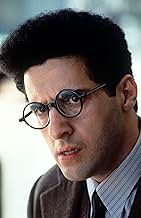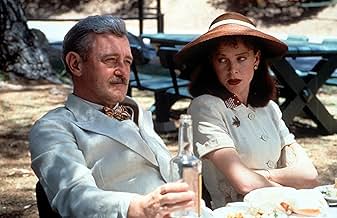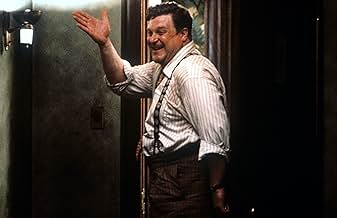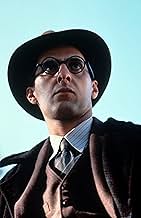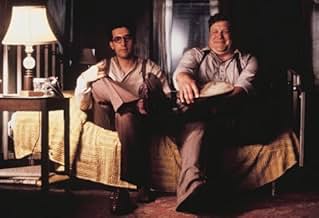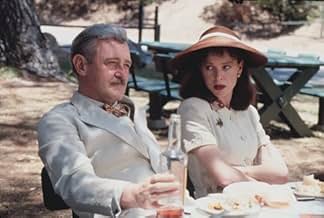अपनी भाषा में प्लॉट जोड़ेंA renowned New York playwright is enticed to California to write for the movies and discovers the hellish truth of Hollywood.A renowned New York playwright is enticed to California to write for the movies and discovers the hellish truth of Hollywood.A renowned New York playwright is enticed to California to write for the movies and discovers the hellish truth of Hollywood.
- 3 ऑस्कर के लिए नामांकित
- 19 जीत और कुल 29 नामांकन
Meagen Fay
- Poppy Carnahan
- (as Megan Faye)
फ़ीचर्ड समीक्षाएं
I liken the Coen brothers to Haagen-Daz ice cream, i.e., various stages of good. I would argue this dark film, laden with more allegories than Dante, is not their best...but, it's good, damn good. To begin with, stellar performances form Turturro, Goodman, Mahoney, Buscemi and Lehner. The thing I find amazing is the skill in bringing so much darkness to such a bright, colorful cinemagraphic work-- remindful of Ingmar Bergman's Cries and Whispers, in that regard-- that teeters on the edge. Goodman's last scene walking into the burning hotel room is eerie but very bright (why not? The damn place is burning down.) This is another great Coen brother film and let's hear it for Ethan and Joel! See it!
The Coen brothers have come a long way from their start with an 8mm camera. They have written and produced some great homages to the film noir era of Hollywood, and this film is no exception.
First, is the great dialog written by the brothers. Great dialog is a feature of their films, and this one has some of the most memorable I have heard. You can almost turn off the visual and just listen and be enchanted and know you are listening to a Coen brothers film.
But turning off the visual would deprive you of the great cinematography of Roger Deakins. His can frame a scene to the point that you could pause the film and just soak in the texture and color and realism. It is almost as if every frame is a painting.
The Coen brothers also seem to get the best performances out of an actor that I have seen. John Goodman is brilliant in this film and he seems to do his best work for the Coens. John Turturro is captivating as the hack writer who talks about his love for the common man, but just really doesn't know the common man and really doesn't care about them. Michael Lerner was brilliant as the requisite man behind the desk that is the feature of 40's noir.
One doesn't always know what is in the Coen brothers minds. Is this a foretelling of the rise of Nazism, of intellectuals who really didn't understand the appeal of fascism to the common man, or a surreal portrait of someone who sells out. No matter what their intention, they make you think and return to see their films again and again.
First, is the great dialog written by the brothers. Great dialog is a feature of their films, and this one has some of the most memorable I have heard. You can almost turn off the visual and just listen and be enchanted and know you are listening to a Coen brothers film.
But turning off the visual would deprive you of the great cinematography of Roger Deakins. His can frame a scene to the point that you could pause the film and just soak in the texture and color and realism. It is almost as if every frame is a painting.
The Coen brothers also seem to get the best performances out of an actor that I have seen. John Goodman is brilliant in this film and he seems to do his best work for the Coens. John Turturro is captivating as the hack writer who talks about his love for the common man, but just really doesn't know the common man and really doesn't care about them. Michael Lerner was brilliant as the requisite man behind the desk that is the feature of 40's noir.
One doesn't always know what is in the Coen brothers minds. Is this a foretelling of the rise of Nazism, of intellectuals who really didn't understand the appeal of fascism to the common man, or a surreal portrait of someone who sells out. No matter what their intention, they make you think and return to see their films again and again.
While many of us know "Fargo" and "Big Lebowski", many fans still haven't heard of "Barton Fink", which is too bad. This is probably John Turturro's best role (and his least weird). Tony Shalhoub also gives an outstanding performance (at least as good as he was in "The Siege").
John Goodman? Heck, even he is pretty good here and I'm not a big fan of his (though the Coen Brothers do him justice like no others can). His portrayal of the questionable neighbor just really suits him.
There is supposed to be deep symbolism in this film -- some say it's an allegory for the rise of Nazism (and I can see that), while others say it's just a critique of Hollywood. I don't know. But, you know what? No matter what it's about, it's beautiful in a nihilistic way... and you will want to know: what's in the box? And I'm not going to tell you.
John Goodman? Heck, even he is pretty good here and I'm not a big fan of his (though the Coen Brothers do him justice like no others can). His portrayal of the questionable neighbor just really suits him.
There is supposed to be deep symbolism in this film -- some say it's an allegory for the rise of Nazism (and I can see that), while others say it's just a critique of Hollywood. I don't know. But, you know what? No matter what it's about, it's beautiful in a nihilistic way... and you will want to know: what's in the box? And I'm not going to tell you.
I'm still not entirely sure what to think of this film. One thing is sure, it won't be easy to forget. This movie is clearly the product of a writer who has struggled with their muse, and equally one who has a healthy mistrust of Hollywood - the sausage grinder. Although Hollywood has been critiqued in film before in similar ways, memorable scenes, clever dialogue, quality acting, and a surreal plot and setting, add together to make this an unusual and different film. Maybe another viewing might add a different dimension. This is by no means 'light entertainment' and it leaves plenty of questions unanswered. But on the whole, an intelligent movie, if something of an enigma. My vote 7/10
You are either going to love or hate this one, and I doubt you'll know which until it's over. Maybe you won't know even then.
In 1941, Barton Fink (John Turturro) is a successful Broadway playwright. Now that he's got some success under his belt, he says he wants to write plays for "the common man". But his agent has a tempting offer. A movie studio wants him to come to LA and write screenplays for 1000 dollars a week. The agent convinces him to go. Barton checks into the Hotel Earle, which has ornate decorations in the common areas, but is a dump from the standpoint of Barton's room. The heat has the wallpaper peeling off the walls. The sole decoration in Barton's room is the picture of a woman sitting on the beach, her arm raised to block the sun. Remember this picture - it's important.
Barton's first assignment is to write a "wrestling picture" starring Wally Beery. But Barton has writer's block for assorted reasons, one of them being that he knows nothing about this subject. So he stares at his typewriter with the dread an insomniac might stare at his bed. But then what seemed to start out being a film about how the studio system can beat the creativity and the confidence out of a successful writer changes course and becomes something that is completely surreal and even nightmarish by the end. I can really say nothing more specific than that without giving things away.
The Coens wrote Barton Fink when they were having writer's block trying to write Miller's Crossing because of the complexity of the plot. So did they manage to pack lots of symbolism into a tight, coherent package, or did they simply let their imagination run wild and undisciplined in an attempt to get back on track on the other film? I have no idea. I just know that I like it and - for me - it's great for repeat viewings.
One more thing - How can it be so hot in LA, and then suddenly WWII has started, which would make it December? Why is it Barton doesn't seem to notice WWII has started without being told and then really has no reaction. He really isn't plugged into "the common man" is he?
In 1941, Barton Fink (John Turturro) is a successful Broadway playwright. Now that he's got some success under his belt, he says he wants to write plays for "the common man". But his agent has a tempting offer. A movie studio wants him to come to LA and write screenplays for 1000 dollars a week. The agent convinces him to go. Barton checks into the Hotel Earle, which has ornate decorations in the common areas, but is a dump from the standpoint of Barton's room. The heat has the wallpaper peeling off the walls. The sole decoration in Barton's room is the picture of a woman sitting on the beach, her arm raised to block the sun. Remember this picture - it's important.
Barton's first assignment is to write a "wrestling picture" starring Wally Beery. But Barton has writer's block for assorted reasons, one of them being that he knows nothing about this subject. So he stares at his typewriter with the dread an insomniac might stare at his bed. But then what seemed to start out being a film about how the studio system can beat the creativity and the confidence out of a successful writer changes course and becomes something that is completely surreal and even nightmarish by the end. I can really say nothing more specific than that without giving things away.
The Coens wrote Barton Fink when they were having writer's block trying to write Miller's Crossing because of the complexity of the plot. So did they manage to pack lots of symbolism into a tight, coherent package, or did they simply let their imagination run wild and undisciplined in an attempt to get back on track on the other film? I have no idea. I just know that I like it and - for me - it's great for repeat viewings.
One more thing - How can it be so hot in LA, and then suddenly WWII has started, which would make it December? Why is it Barton doesn't seem to notice WWII has started without being told and then really has no reaction. He really isn't plugged into "the common man" is he?
क्या आपको पता है
- ट्रिवियाThe first film to win all three major awards (Palme D'or, Best Director, and Best Actor) at the Cannes Film Festival. Also, it was unanimously chosen for the Palme D'or.
- गूफ़Briefly visible at the top of the screen when Detective Mastrionotti introduces himself to Barton.
- भाव
Charlie Meadows: Look upon me! I'll show you the life of the mind!
- क्रेज़ी क्रेडिटThe 20th Century Fox logo appears over silence; the "fanfare" is not played.
- साउंडट्रैकFor Sentimental Reasons
by Edward Heyman, Al Sherman and Abner Silver
Licenced with Permission the Successors of Marlo Music Corporation (ASCAP)
टॉप पसंद
रेटिंग देने के लिए साइन-इन करें और वैयक्तिकृत सुझावों के लिए वॉचलिस्ट करें
विवरण
- रिलीज़ की तारीख़
- कंट्री ऑफ़ ओरिजिन
- भाषा
- इस रूप में भी जाना जाता है
- Barton Fink
- फ़िल्माने की जगहें
- उत्पादन कंपनियां
- IMDbPro पर और कंपनी क्रेडिट देखें
बॉक्स ऑफ़िस
- बजट
- $90,00,000(अनुमानित)
- US और कनाडा में सकल
- $61,53,939
- US और कनाडा में पहले सप्ताह में कुल कमाई
- $2,68,561
- 25 अग॰ 1991
- दुनिया भर में सकल
- $61,54,231
- चलने की अवधि
- 1 घं 56 मि(116 min)
- रंग
- ध्वनि मिश्रण
- पक्ष अनुपात
- 1.85 : 1
इस पेज में योगदान दें
किसी बदलाव का सुझाव दें या अनुपलब्ध कॉन्टेंट जोड़ें




